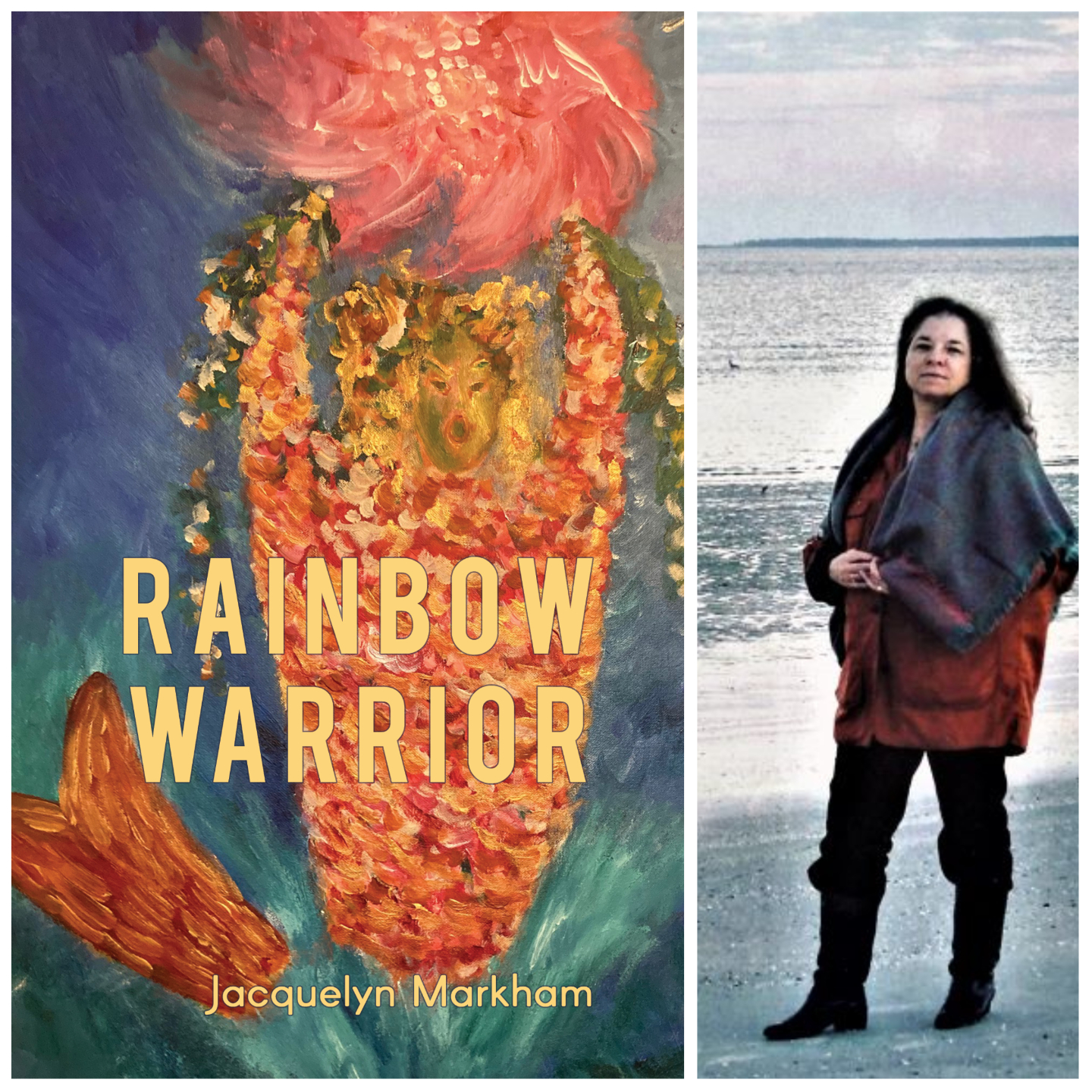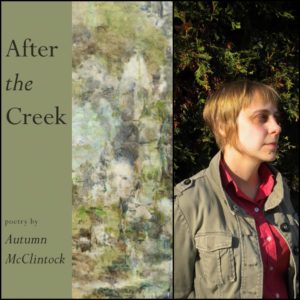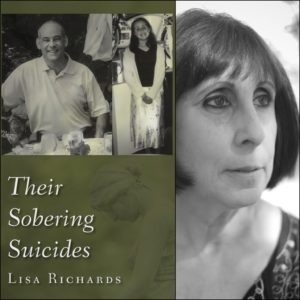Description
Rainbow Warrior
by Jacquelyn Markham
$17.99, paper
979-8-88838-113-7
2023
The powerful poems in Rainbow Warrior make connections between the lives of the islanders of the South Pacific impacted by nuclear testing on Bikini and nearby islands and the Deep Water Horizon oil spill that devastated land and sea off the coast of Louisiana. The poems in this collection, some narrative, some epic, some lyrical, reveal the human toll of environmental disasters. Images of the lone Ivory Billed Woodpecker, now extinct, juxtaposed with a child listening to the “Mother of the Sea” chant from a spiral shell, or fledglings the “size of pennies/…copper in the sun” make everyday moments of healing and beauty in nature even more poignant. These poems that follow the moon and the tides strike awe in our hearts and move us toward a deeper social consciousness.
Jacquelyn Markham has loved poetry since wandering through the meadow along a mint lined brook as a child in rural Michigan. She has written poetry nearly as long, so as a freshman in college, she decided to make a career of it. After earning her bachelor’s degree in English, she earned a masters and a doctorate in English and Creative Writing from Florida State University. Author of two chapbooks and a personal mythology, Peering Into the Iris: An Ancestral Journey, she has published nationally and internationally in literary journals, magazines, and anthologies, including Archive: South Carolina Poetry Since 2005, Adrienne Rich: A Tribute Anthology, Anthology of Appalachian Writers, Lullwater Review, Hawaii Pacific Review, The High Window, Woman and Earth, among others.
During her academic career, Markham’s love of poetry extended to scholarship as she “rescued” 19th century women poets who had fallen into obscurity, focusing on collecting the far-flung poems published by Charlotte Perkins Gilman during her lifetime. The result is the award-winning reference The Complete Poetry of Charlotte Perkins Gilman, 1884-1935, Together with Commentary and Notes (Mellen Press), a thirty-year project that was awarded the Adele Mellen Prize “for its distinguished contribution to scholarship.”
Markham is a recipient of numerous grants and awards for literary merit, including three Georgia Council for the Arts individual artist grants, a South Carolina Arts Commission Community Grant, and an Arts Kentucky Women’s Foundation Award. As a humanities scholar, Dr. Markham has presented hundreds of papers, lectures, and readings of her original work. As a participant in the poets in the schools program, she has guided young poets and writers in workshops and as faculty advisor to student literary journals. Although she retired from university teaching as full professor in English and Women’s Studies, she continues to mentor poets and writers in community settings. She lives and writes near the coast in South Carolina.






Quitman Marshall –
We are drowning in savage ironies: in politics; in war; in our environment; in our very essence as human animals. That Jacquelyn Markham uses the casually savage destruction in 1954 of the Bikini Atoll as the centerpiece for her moving suite of poems, Rainbow Warrior, both underscores the irony and demonstrates the impoverishment of our modernity. Those of us old enough to remember the terror and brinkmanship of the Cold War should always remember that Bikini was obliterated, and a vast portion of the Pacific poisoned, by a U.S. hydrogen bomb: “one hundred times the power of Hiroshima/one thousand times the power of Hiroshima,” as the poet puts it, as if to lull us with the corrupted waves of power by which “men turn themselves into gods.”
And we, back home in our American fortress, will remember “This is only a test.” Are we so used to the nearly seamless rapidity with which the latest “technological advance” (from the bomb to the smart phone) is turned into an amusement for the masses and a magnet for capitalistic (or worse) exploitation that we were not struck by a unique people’s homeplace, after being turned to toxic dust, becoming the name for a scandalously tiny woman’s bathing suit, one always in danger of being lost in the waves? Not really for swimming, the bikini may approach the natural state, but it surely doesn’t take us back to The Garden. Western eyes have for several centuries projected their ideas of Paradise unto Pacific islands and the people there. Thus, we re-enact our ancient errors.
Markham makes it clear that Bikinians were eviscerated by the nuclear “testing.” She begins her book with a lament: “Even in dreams I cannot be happy…Nothing can be right for me.” While the Greenpeace ship, Rainbow Warrior, is well known for its efforts to rescue marine animals, it is less known for its role in rescuing members of our species from the Rongelap Atoll, east of Bikini, as it became clear that their world was poisoned. Markham structures her book to show us the wider effects of technological hubris. At the time of the Bikini explosion “coral from the morning sky seemed a miracle of snow” after which “it killed a young man as quickly as an old.” Rongelap remains too toxic for human habitation, even as its relocated inhabitants ceaselessly hope to return. The poet takes wisdom from the ancient oral literatures of indigenous people, the Pacific islanders as well as, surprisingly, from a myth attributed to the North American Cree Indian nation from which the rescue ship took its name: “a Rainbow Warrior will descend from the sky to save those on earth from extinction.” Are we paying attention?
The middle section of Markham’s book is a rescue of memory. She has shown us how beauty was corrupted, how multiple lives, from fish to plants to “the dreams/the graves,” vanished.
There are those displaced and those reckoning with the after-effects of the terrible bomb.
“I live in two worlds/in one I want to have a child/in another I am afraid…” These are our worlds also. The poet gives us poignant imagery of the lost world, the memories, still true: “the ocean is our supermarket/the ocean is our spirit…” followed by the synthetic nightmare, “the ocean is killing us slowly.”
We may give in to despair, yet increasing throughout these poems, as the book comes to a close, and even as we see the extent of our continuing corruption–“Shape shifting, now the black, the brown, the red/a deep sea `oil plume’ 15 miles across? More and changing,/3300 feet deep? More and shifting, moving, /amoeba-like, separating, growing.” (Deepwater Horizon oil spill)—set against the beauties of her home along the Carolina coast, readers should take what comfort they can from the birth-giving imagery Markham has threaded throughout her generous work. Whether our species lives to continue to see it: “Tides turn/moon sets/the horizon [notice the irony, if you can’t help it, of the oil rig’s theft of this word] pushes/the sun out of the red sky.” We were once here to see it. This little book, in vast ways, reminds us of all the beauty we are losing. Read it and weep…or allow yourself to be reborn to the extent of your responsibilities.
Quitman Marshall, Swampitude: Escapes With the Congaree, You Were Born One Time, and other titles.